Ever wonder what happens to a Gyapa cookstove when it breaks? It's repaired and reused!
Our Gyapa cookstoves come with a 3-year warranty, but Gyapa can last up to 10 years. If the Gyapa breaks, it can easily be fixed since Gyapa cookstoves are made locally by producers and manufacturers in Ghana. In the video above, Gyapa cookstove producers at Ketejia Market in Kumasi repair a stove with a broken ceramic liner for a customer. To learn more about Gyapa cookstove manufacturing, including the use of recycled metal materials including old cars, refrigerators and roofing, check out the Gyapa cookstove page on our website: http://www.gyapa.com/gyapa-fuel-efficient-cookstove.html
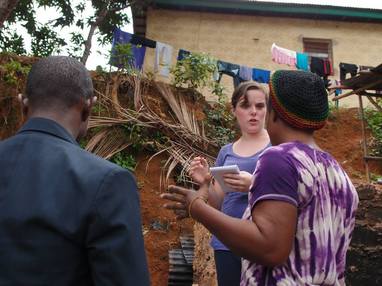 Issy interviews people in Sierra Leone Issy interviews people in Sierra Leone I have just got back from Sierra Leone where I was staying in the capital, Freetown. I was in Freetown for 3 weeks where I undertook a market assessment of Freetown’s improved cookstove market.
The Sierra Leone diet is similar to the Ghanaian diet; Fufu, Tilapia and Groundnut Soup are all common place. Another significant part of Sierra Leone diet are their green stews, made with either cassava leaf or potato leaf, but as I was talking to people about their eating habits, many of the guys would say they didn’t actually like it, which reminded me of my brothers adverse to anything green when we were growing up.
As I headed into town on the first day, I saw a mural which said ‘stop bush fires, stop charcoal burning, respect the law’ which was a little alarming, seeing as I’m here to research stoves that use charcoal. Upon closer inspection, it appeared to be an initiative of USAID and the US Forest Service International Programs. I later learned that there is a ban on charcoal production in Freetown.
Going to the market is always a lot of fun, as there is so much to see and potentially buy, so conducting the market research in the markets of Freetown was always going to be an exciting experience.
The central market in Freetown appeared to be never ending streets of stalls. At first, I was aimlessly walking around trying to find stalls that were selling cookstoves. Eventually I gave in and asked around. The stall holders I spoke to said to head to Ferry Junction, which was in a different part of town. I couldn’t really believe that there wasn’t anyone who sold cookstoves in the centre of town. So I carried on wandering around with the hope of finding something, and it also allowed me to enjoy and see parts of Freetown. I eventually came across a stall selling traditional coal pots. The guy running the stall was called ‘Elder Rider’ (he even had a helmet to prove it). ‘Elder Rider’ was an interesting character. As I approached, he said ‘This is an African store.' I explained what I was doing and after a while he agreed to chat with me. He provided some interesting responses to my questions, and he was a great first interview to get my project started.
I spoke to a variety of Sierra Leoneans, including commercial cooks and caterers. One amazing lady was called Fatimata, and she had a business selling breakfasts and lunches to a large office in Freetown. She would get up at 2am to start cooking, and would leave for the office at 6am to provide the office workers with both breakfast and lunch. She also had to cook for her household of 5 people. I’m not sure if she ever slept!
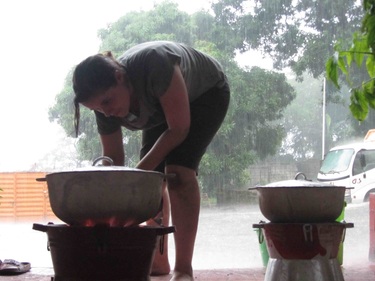 Conducting water boiling tests Conducting water boiling tests As a way of assessing how efficient the existing improved cookstoves that are available in Sierra Leone, I conducted a boiling water test on 3 different types of improved cookstoves and the traditional metal coal pots. I thought this was going to be fairly straight forward task, but it turned into somewhat difficult. I never thought the sight of boiling water would please me so much. Teaching myself how to competently use the cookstoves took some work, so when I finally had boiling water it felt like a huge success.
I have managed to meet with some great characters whilst in Sierra Leone, as well as see some amazing sights. I am now in my final few weeks working with Gyapa Enterprises before I go back to the UK.
We are introducing a new innovative label for our Gyapa fuel-efficient cookstoves. Every stove will have an individual warranty code, which not only allows customers to claim their warranty, but also certifies that they have purchased an Original Gyapa.
In this new commercial, airing late July on Ghana TV, Gyapa cookstove retailer, Rebecca, teaches a customer about the new certified Original Gyapa labels. Video
Watch our new commercial detailing the benefits of our new Gyapa cookstove labeling system (above)
On set
Our own staff member, Agnes Ofosu, stars in the new commercial, accompanied by Rebecca, a retailer who has been selling Gyapa cookstoves for 9 years
“With the support of ClimateCare, carbon finance has enabled RI/EW to take a market based approach to the GyapaTM program in Ghana and turn it into a self-sustaining model for success across the sector. ClimateCare’s unparalleled expertise in the carbon market has resulted in the continued sale of GyapaTM carbon credits which has provided the necessary investment for continued growth and success,” states Chip Levengood, RI Board Chairperson.
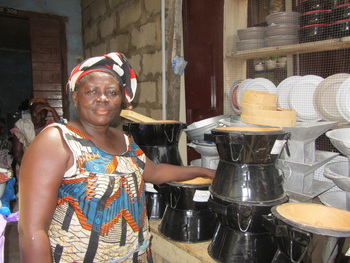 Photo of Gyapa retailer, courtesy of Issy Photo of Gyapa retailer, courtesy of Issy Hey, it’s ‘Issy the Intern.’ I've been kept very busy, and I'm excited to share what I've been up to. My big assignment has been 'mapping' retailers and producers in Ghana by taking photos and tagging them using the GPS function of my camera. I spent the first couple of days in the office getting to grips with the GPS function on my camera and how I could use it in order to create the network map of Gyapa cookstoves. We went to Makola and Madina Market where we met various retailers of Gyapa cookstoves. This was my first experience of a Ghanaian market, having spent the last 4 and bit years living in Brighton, England with their famous South Lanes, I was fairly accustomed to narrow, weaving alleys and walkways, but Makola & Madina Market are on another level. With stock towering over you I’m not sure if someone with claustrophobia would be able to cope. For me, however, it was a great experience. In Makola Market we met two wonderful retailers, Susie and Evelyn, and both gave fantastic interviews. While Carole Lundgren was interviewing them for a supply chain video project, I took photos, which allowed us to post updates on Facebook and Twitter about what we are doing before all the editing is complete. After finishing the interviews with both Susie and Evelyn we went across the city to Madina Market where we interviewed two further retailers and a commercial user. It was great to hear people say such positive things about Gyapa cookstoves, and we will definitely be able to make some cool videos out of the footage we got. We finished the day by going to visit two end users of Gyapa and got interviews with them. It was great to hear opinions of Gyapa from end users, which are not affiliated with the scheme. One of them gave such an amazing testimonial, we couldn’t quite believe it: "Gyapa is the best for every household." On Friday we took the 2 hour journey to Winneba, which is to the west of Accra, to visit Ekem. Ekem produces the clay liners, and this is what makes Gyapa so fuel efficient, as it retains the heat so users do not have to use as much charcoal. It was really interesting to hear what Ekem had to say, as he has worked with Gyapa Enterprises for 10 years and so has been there right from the beginning. He described in great detail the processes behind making the clay liners, which is a critical part of the Gyapa cookstove. I also used this opportunity to gather GPS points. The aim is to plot where all the producers and retailers are, and the aim to plot all the retailers and producers so we can see the distribution of the stoves. It is a great way for everyone to see the impact the programme has had, and is embedded into our website, so that everyone can see that faces of Gyapa! It’s been a great time here in Ghana. I've had some great experiences meeting the various people that are a part of the Gyapa network. I am looking forward to more visits to retailers and producers, because it is these amazing people that make the Gyapa cookstove network so great. See Issy's GPS Google map project on our Impact page: http://www.gyapa.com/impact.html
|


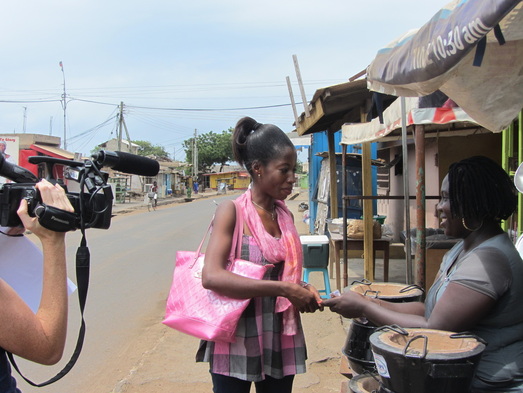
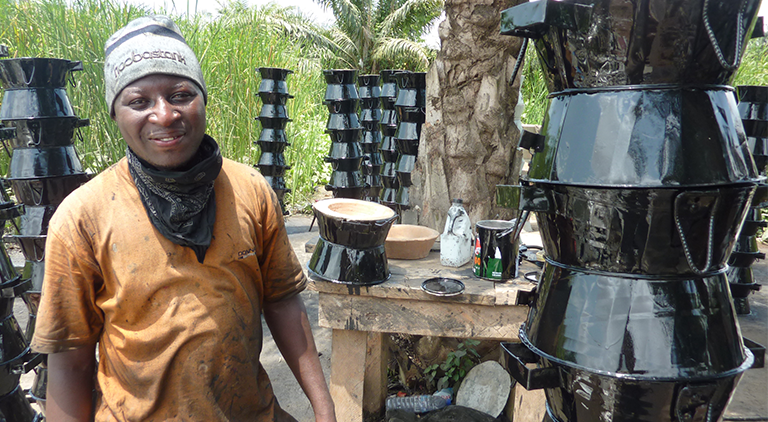

 RSS Feed
RSS Feed
